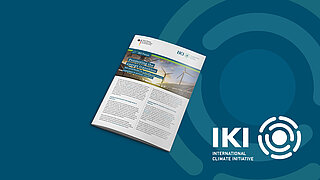Promoting the energy transition
Prioritised field of action in the IKI funding area mitigation of greenhouse gas emissions (as of March 2025)

In the energy transition field of action, the International Climate Initiative (IKI) focuses on the further development of energy transition technologies, their financing and their socially just design – building on experience gained in Germany. The goal is to ensure social acceptance of the necessary transformation.
When it comes to the further development of technologies, the IKI endeavours to support specific areas of the energy sector in line with demand. This includes above all:
- The large-scale expansion of renewable energies
- Energy efficiency measures
- The use of green hydrogen (including as energy storage)
- Sector integration
- Network expansion
- Cooling and heating
In particular, adjustments to the electricity system and electricity market design in conjunction with targeted grid expansion and grid modernisation should play an important role in the future.
Close coordination of the instruments
In order to organise cooperation in the energy sector in a partner-oriented and efficient manner, activities are closely coordinated with other instruments of the Federal Government. These include energy and climate partnerships and energy dialogues, Just Energy Transition Partnerships (JETPs) and projects funded exclusively by the German Federal Ministry for Economic Cooperation and Development (BMZ).
Increasing energy efficiency and expanding renewables
The extraction of fossil primary energy sources, their further processing and the use of fossil-based energy are responsible for around two thirds of global greenhouse gas (GHG) emissions. In order to limit the global temperature rise to 1.5 degrees Celsius, the Intergovernmental Panel on Climate Change (IPPC) states that the energy sector must be decarbonised worldwide by 2050. If we are to achieve this, increasing energy efficiency in all areas, for example buildings and industry, is one of the most economically relevant and effective contributions to GHG reduction – also to reduce the absolute growth of the energy sector.
Where generation is concerned, the focus is on phasing out the production and utilisation of fossil fuels. Accordingly, energy requirements must be increasingly met by utilising renewable energies. In the electricity sector, this is also linked to the needs-based expansion of electricity grids, intelligent load management and the use of innovative storage technologies.
More than 90 per cent of countries have announced measures to decarbonise the energy sector in their nationally determined contributions (NDCs). Both the NDCs and the long-term strategies (LTS) require significant ambition raising in order to decarbonise the entire energy sector over the coming decades and implement the Paris Agreement.
Integration of the electricity, heating, cooling and mobility sectors necessary
Complete decarbonisation of the economy also requires increasing electrification in new application areas such as the mobility sector. To this end, technical, economic and management solutions for sector coupling must be provided and trialled. In other words, the electricity, heating, cooling and mobility sectors must be increasingly integrated. This also increases the need to make energy systems more flexible. The aim is to integrate very high shares of renewable energies into the grid, minimise curtailment of renewable energy plants and thus accelerate the phase-out of energy generation from fossil fuels.
Cities and regions play an important role in the planning and provision of corresponding infrastructure, for example for district heating networks, charging infrastructure and electrically powered public transport systems.
Just Transition – fair change in the energy sector
The fundamental transformation of energy systems and markets is not a purely technological challenge, but also a socio-economic one. Against this background, IKI projects contribute to a just transition – away from an economy based on coal, natural gas and crude oil and towards an economy based on renewable energies and a significant reduction in electricity consumption through energy efficiency measures.
Long-term socio-economic aspects (in particular local jobs, regional structural change, environmental impact and health) are to be considered through political and social dialogues, for example, and guidelines developed to support political decisions.
Another important aspect of the transformation of the energy sector is the provision of technically orientated advice to established players such as utility companies.
Utilisation of green hydrogen and Power-to-X as key technologies
In some sectors and application areas (e.g. aviation), decarbonisation and substitution of fossil fuels in specific application areas can only be achieved using power-to-X (PtX) technologies. This entails producing corresponding substitute products, such as paraffin, from green hydrogen and CO2.
With the national hydrogen strategy, the German government is acknowledging the increasing importance of hydrogen. Green hydrogen and PtX are important contributions to climate protection in sectors and areas in which it will not be possible to use more efficient technologies in the foreseeable future. This applies in particular to the steel industry, the chemical industry and parts of the transport sector (especially air and sea transport). It is precisely here that the targeted use of green hydrogen is a key component on the road to a climate-neutral economy.
The IKI therefore supports its partner countries in the development of their national hydrogen policies and the market ramp-up for green hydrogen and PtX. In terms of applications, the IKI supports topics relating to sector coupling and local applications that are appropriate in terms of climate policy. In addition to providing political and technical support, it networks national and international actors, allowing them to utilise synergies.
Climate-friendly cooling technologies
Climate-friendly cooling technologies that work with natural refrigerants such as ammonia, hydrocarbons or CO2 are more environmentally friendly than the conventionally used fluorinated substances (e.g. CFCs), and the IKI is promoting such technologies worldwide. In this way, it supports international and bilateral cooperation in climate and ozone protection policy as well as a sustainable transformation of the cooling sector.
The aim is to establish the use of natural refrigerants internationally and to support the introduction of energy-efficient refrigeration and air conditioning systems in conjunction with renewable energies. This requires a solid data basis, international standards, a supportive legal framework, knowledge transfer and access to funding opportunities. To this end, the IKI is strengthening institutional and technical capacities in the partner countries and seeking funding opportunities.
Technical cooperation and pilot demonstration projects demonstrate both the economic and ecological advantages of a sustainable technology shift in the partner countries. This is particularly relevant against the backdrop of increasing global warming in many parts of the world, as the cooling sector is becoming increasingly important for both individuals and businesses as a result.
Co-benefits of the energy transition
The expansion of renewable energies and the introduction of energy efficiency measures offer great advantages for the economy, society and climate action.
This is particularly true in developing and emerging countries, where such measures result in increased supply security and reduced energy imports. Investments ensure long-term value creation and new jobs are created. In cities in particular, energy-efficient and low-emission buildings improve the health and well-being of users and reduce local air pollution.
Nevertheless, economic, energy and climate policy have often been considered independently of each other. In order to reduce this discrepancy, IKI projects help raise partners’ awareness and support the analysis of co-benefits as added value that goes beyond the intended objective of climate protection.
Selected projects
- H2-diplo - Decarbonization Diplomacy
- MENALINKS: Linking ambitious renewable energy development and efficient sector coupling in the MENA region
- Energy Transition Mechanism Partnership Trust Fund (ETMPTF)
- Innovation Regions for a Just Energy Transition
- PtX Dialogue: Building a global knowledge and exchange platform for PtX
- Enabling Long Term Defossilisation Pathways through Power-to-X (PtX Pathways)
- Clean, Affordable and Secure Energy for Southeast Asia (CASE)
- ExploRE - Strategic exploration of economic mitigation potentials through renewables
- Partnership for energy efficiency in buildings (PEEB)
- Resource and land use management promoting carbon capture/storage through compensation payments
Funding area
IKI Factsheet
The IKI Strategy
The IKI wants to maximise its impact on climate action and biodiversity conservation. To this end, it concentrates its funding activities on prioritised fields of action within the four funding areas. Another key element is the close cooperation with selected partner countries, especially with the IKI’s priority countries.
The link has been copied to the clipboard









![[Translate to English:]](/fileadmin/_processed_/a/4/csm_20250327_PhomPenh_AdobeStock_1290631159_bf56228de3.jpg)

![[Translate to English:]](/fileadmin/_processed_/7/2/csm_20241213_RE_Anlage_Dach_Privatsektor_Initiative_BMWK_2b2c722b5a.jpg)



